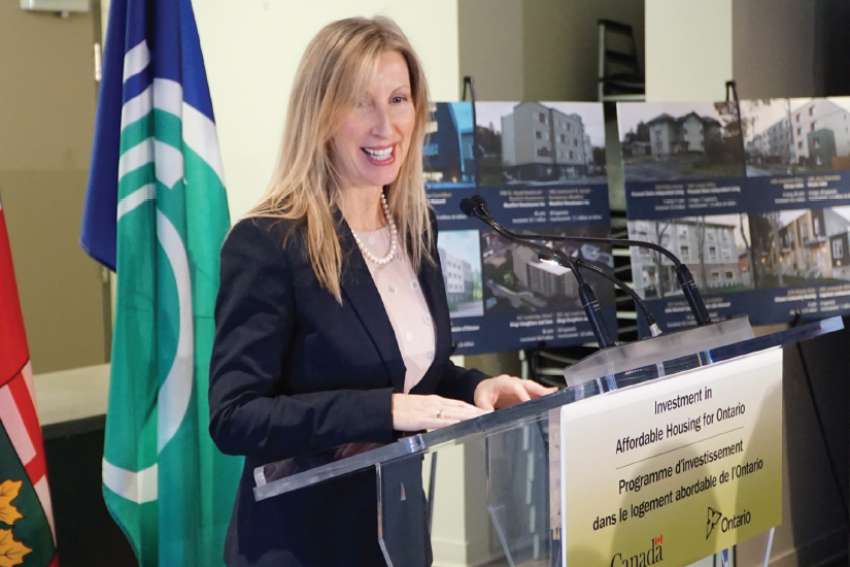They have both served her well.
“Who knew there was a housing org that could absolutely use that kind of knowledge base,” Le, 46, recalled with a laugh.
For the last five years, Le has been executive director of Ottawa’s Multifaith Housing Initiatives, an independent charity that manages about 140 apartment units in various parts of the city.
Its latest project is a $20-million, eight-building, 98-unit affordable housing complex called The Haven, which opened last spring, and it’s the first project where MHI has been able to fully implement its vision, said Le.
“What we want to do is equip our tenants to be able to live and move comfortably in a multicultural, multi-religious society,” said Le.
Funding for the project came from all three levels of government, which last month jointly announced another $74 million investment into affordable housing in the Ottawa area.
MHI now has plans underway to build a 40-unit special purpose unit to house mentally and physically handicapped veterans, working with Veterans Affairs, The Legion, True Patriot Love, Soldiering On and other groups, Le said. They hope to start construction later this year.
Le had no housing background when she joined MHI in 2002 after working as a researcher and writer with a communications consulting company.
She now works with the volunteers and the various partner organizations to imagine projects, “to move our way through opportunities that will enable these projects to become reality,” said Le. “I oversee development from conception to operationalization.”
She also organizes fundraising and navigating the various levels of government that have contributed to projects like The Haven.
It’s a juggling act that requires a mix of business savvy, diplomacy and, not least, faith. Her studies at both Saint Paul University and Carleton in Ottawa helped prepare Le for the task.
Ironically, she recalled that her Master’s thesis focused on genocide.
“I studied how societies are broken down to allow the absolute worst to happen and this is an organization that takes people of all different religious backgrounds and brings them together to create a real societal benefit. It’s created to serve society.”
The Catholic mother of three oversees a small paid staff that includes a manager of community engagement volunteers who is Muslim, a manager of fund development who is Buddhist and an office administrator who is Protestant.
“We are very clear with what our mandate is and who we are,” Le said. “We’re open to everybody who is open to working with others in a respectful manner, and enjoys the opportunity to enrich their knowledge of other people from different cultural and religious backgrounds,” Le said.
“You have to have an openness to work with other people. If you’re coming in with a conversion mentality this isn’t a great place for you,” she said. “We want people to learn about each other and respect each other.”
Gay Richardson, an Anglican from St. John the Evangelist, remembers pre-MHI days when the Ottawa archdiocese’s Social Justice Commission formed a committee to address the crisis of affordable housing in the city. At first it was only Christians involved, but they agreed “we should be looking broadly.”
It evolved into the interfaith housing committee that continued to meet at the archdiocese until MHI was incorporated in late 2002 as a charity.
“At first our goal was simply to encourage faith communities to build housing themselves,” said Richardson, who served as secretary and administrator of MHI on a volunteer basis until 2008. But they soon realized most faith communities didn’t see housing as a mission. So the committee revised their charity mandate in 2004 and MHI began to slowly acquire properties for social housing.
“It’s been this gradual evolution, but the huge leap that we’ve taken has been under Suzanne’s leadership,” Richardson said.
Catholic Deacon Hugh O’Donnell joined the MHI board in 2010. At the time, MHI was managing about 40 units, serving 100 people, 30 of them children.
“Then we did a strategic planning exercise as any good organization should do,” said O’Donnell. who stepped down as president of the board last year. “We decided by 2020, we would double our number of units. The plan was to go to 80.”
They were looking at acquiring more properties. In the meantime, Le had joined the staff and, in 2014, the City of Ottawa released some land in Barrhaven, a suburban neighbourhood, and offered a competition to groups for the best social housing proposal.
Le guided the whole process, from entering the competition to completion of what became The Haven.
About 350 people now live in The Haven, including Syrian refugees, seniors, young families with children, and adults with cognitive disabilities living on their own for the first time, said Le.
“In a nutshell, MHI is faith in action, it is communities building communities. We are faith in action.”


